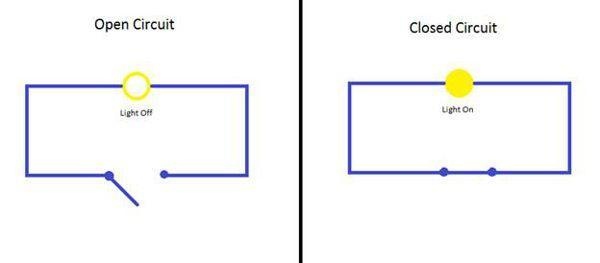
What happens to a circuit when the switch is off?
(A) The circuit is complete
(B) The circuit is now an open circuit
(C) Electricity flows continuously
(D) Electricity flows discontinuously
Answer
233.1k+ views
Hint: A switch in an electric circuit has 2 states. One of them is open state and the other is known as closed state. Open state means that it is not connected or, the connection is not complete and is hence open. In this state no current passes. The other state is known as the closed state, in this the connection is closed and current flows through the circuit.
Complete step-by-step solution
In a circuit a cell is connected along with a switch which provides constant current in the circuit. So when the switch is turned off the current flow does not happen because the charges are not moving. No electricity is flowing in that particular circuit and is expected to flow only in a closed circuit.


Since no current flow is observed in the circuit when the switch is turned off the circuit is called an open circuit.
The correct option is B - The circuit is now an open circuit.
Note
(A) In the open circuit:
1. Current through the circuit is zero
2. Potential difference between at the open is E
3. Potential difference at components is zero
(B) In closed circuits:
1. Current is given by $I = \dfrac{E}{{R + r}}$
2. Potential difference is \[V = IR\]
3. Power dissipated in external resistance is \[{I^2}R\]
4. Internal resistance of the cell is $r = \left( {\dfrac{E}{V} - 1} \right)R$
Complete step-by-step solution
In a circuit a cell is connected along with a switch which provides constant current in the circuit. So when the switch is turned off the current flow does not happen because the charges are not moving. No electricity is flowing in that particular circuit and is expected to flow only in a closed circuit.


Since no current flow is observed in the circuit when the switch is turned off the circuit is called an open circuit.
The correct option is B - The circuit is now an open circuit.
Note
(A) In the open circuit:
1. Current through the circuit is zero
2. Potential difference between at the open is E
3. Potential difference at components is zero
(B) In closed circuits:
1. Current is given by $I = \dfrac{E}{{R + r}}$
2. Potential difference is \[V = IR\]
3. Power dissipated in external resistance is \[{I^2}R\]
4. Internal resistance of the cell is $r = \left( {\dfrac{E}{V} - 1} \right)R$
Recently Updated Pages
JEE Main 2023 April 6 Shift 1 Question Paper with Answer Key

JEE Main 2023 April 6 Shift 2 Question Paper with Answer Key

JEE Main 2023 (January 31 Evening Shift) Question Paper with Solutions [PDF]

JEE Main 2023 January 30 Shift 2 Question Paper with Answer Key

JEE Main 2023 January 25 Shift 1 Question Paper with Answer Key

JEE Main 2023 January 24 Shift 2 Question Paper with Answer Key

Trending doubts
JEE Main 2026: Session 2 Registration Open, City Intimation Slip, Exam Dates, Syllabus & Eligibility

JEE Main 2026 Application Login: Direct Link, Registration, Form Fill, and Steps

JEE Main Marking Scheme 2026- Paper-Wise Marks Distribution and Negative Marking Details

Understanding the Angle of Deviation in a Prism

Hybridisation in Chemistry – Concept, Types & Applications

How to Convert a Galvanometer into an Ammeter or Voltmeter

Other Pages
JEE Advanced Marks vs Ranks 2025: Understanding Category-wise Qualifying Marks and Previous Year Cut-offs

Dual Nature of Radiation and Matter Class 12 Physics Chapter 11 CBSE Notes - 2025-26

Understanding Uniform Acceleration in Physics

Understanding the Electric Field of a Uniformly Charged Ring

JEE Advanced Weightage 2025 Chapter-Wise for Physics, Maths and Chemistry

Derivation of Equation of Trajectory Explained for Students




